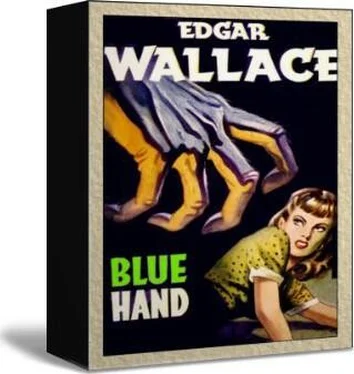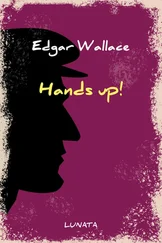Edgar Wallace - Blue Hand
Здесь есть возможность читать онлайн «Edgar Wallace - Blue Hand» весь текст электронной книги совершенно бесплатно (целиком полную версию без сокращений). В некоторых случаях можно слушать аудио, скачать через торрент в формате fb2 и присутствует краткое содержание. Год выпуска: 0101, Жанр: Старинная литература, на английском языке. Описание произведения, (предисловие) а так же отзывы посетителей доступны на портале библиотеки ЛибКат.
- Название:Blue Hand
- Автор:
- Жанр:
- Год:0101
- ISBN:нет данных
- Рейтинг книги:3 / 5. Голосов: 1
-
Избранное:Добавить в избранное
- Отзывы:
-
Ваша оценка:
- 60
- 1
- 2
- 3
- 4
- 5
Blue Hand: краткое содержание, описание и аннотация
Предлагаем к чтению аннотацию, описание, краткое содержание или предисловие (зависит от того, что написал сам автор книги «Blue Hand»). Если вы не нашли необходимую информацию о книге — напишите в комментариях, мы постараемся отыскать её.
Blue Hand — читать онлайн бесплатно полную книгу (весь текст) целиком
Ниже представлен текст книги, разбитый по страницам. Система сохранения места последней прочитанной страницы, позволяет с удобством читать онлайн бесплатно книгу «Blue Hand», без необходимости каждый раз заново искать на чём Вы остановились. Поставьте закладку, и сможете в любой момент перейти на страницу, на которой закончили чтение.
Интервал:
Закладка:
“Humiliating as this experience was, I did not for one moment doubt that the magistrate would find some excuse for me and discharge me. The shame of that moment as I stood there in the dock, with the curious crowd sneering at me! I cannot even speak of it to-day without my cheeks burning. The magistrate listened in silence, and presently he looked at me over his glasses and I waited.
“‘There has been too much of this sort of thing going on,’ said he, ‘and I am going to make an example of you. You will go to prison with hard labour for one month.’
“The court, the magistrate, the people, everything and everybody seemed to fade out, and when I came to myself I was sitting in a cell with the jailer’s wife forcing water between my teeth. Jane had betrayed me. She had lied when she said she would go to the magistrate, but her greatest crime had yet to be committed.
“I had been a fortnight in Holloway Gaol when she came to visit me. I was not a strong woman and they put me to work with several other prisoners in a shed where the prison authorities were making experiments with dyes. You probably don’t know much about prisons,” she said, “but in every county gaol through England they make an attempt to keep the prisoners occupied with some one trade. In Maidstone the printing is done for all the prisons in England—I learnt a lot about things when I was inside Holloway! In Shepton Mallet the prisoners weave. In Exeter they make harness. In Manchester they weave cotton, and so on.
“The Government were thinking of making one of the prisons a dye-works. When I came to the little interview-room to see Jane Groat, I had forgotten the work that had stained both my hands, and it was not until I saw her starting at the hands gripping the bars that I realized that the prison had placed upon me a mark which only time would eradicate.
“‘May, look!’ she stammered. ‘Your hands are blue!’
“My hands were blue,” said Lady Mary bitterly. “The Blue Hand became the symbol of the injustice this woman had worked.
“I did not reproach her. I was too depressed, too broken to taunt her with her meanness and treachery. But she promised eagerly that she would tell my husband the truth, and told me that the baby was being taken care of, and that she had sent it with her own maid to Margate. She would have kept the baby at her own house, she said, and probably with truth, but she feared the people, seeing the baby, would wonder where I was. If the baby was out of town, I too might be out of town.
“And then occurred that terrible accident that sent, as I believed, my darling baby to a horrible death. Jane Groat saw the advantage which the death gave to her. She had discovered in some underhand fashion the terms of my husband’s will, terms which were unknown to me at the time. The moment Dorothy was gone she went to him with the story that I had been arrested and convicted for shop-lifting, and that the baby, whom it was my business to guard, had been left to the neglectful care of a servant and was dead.
“The shock killed Jonathan. He was found dead in his study after his sister had left him. The day before I came out of prison I received a note from Jane telling me boldly what had happened. She made no attempt to break to me gently the news of my darling baby’s death. The whole letter was designed to produce on me the fatal effect that her news had produced on poor Jonathan. Happily I had some money and the property in the City, which my husband, in a moment of generosity, which I am sure he never ceased to regret, had given to me. At my father’s suggestion I turned this into a limited liability company, the shares of which were held, and are still held, by my father’s lawyer.
“Soon after my release my father inherited a considerable fortune, which on his death came to me. With that money I have searched the world for news of Dorothy, news which has always evaded me. The doubt in my mind as to whether Dorothy was dead or not concentrated on my mistrust of Jane. I believed, wrongly, as I discovered, that Jane knew my girlie was alive. The Blue Hand was designed to terrorize her into a confession. As it happened, it only terrorized the one person in the world I desired to meet—my daughter!”
Salter had listened in silence to the recital of this strange story which Lady Mary had to tell.
“That clears up the last mystery,” he said.
CHAPTER THIRTY-FIVE
EUNICE woke and, opening her eyes, tried hard to remember what had happened. Her last clear recollection was of her room in Grosvenor Square. The last person—she shivered as she recalled the moment—was Digby Groat, and he was coming towards her—she sat up in bed and reeled with the pain in her head. Where was she? She looked round. The room was meanly furnished, a heavy green blind had been drawn over the small window, but there was enough light in the room to reveal the shabby wardrobe, the common iron bed on which she lay, the cheap washstand and the threadbare carpet that covered the floor.
She was fully dressed and feeling horribly grimy. She almost wished at that moment she was back in Grosvenor Square, with its luxurious bathroom and its stinging shower-baths.
But where was she? She got off the bed, and, staggering across the room, she pulled aside the blind. She looked out upon the backs of drab buildings. She was in London, then. Only London could provide that view. She tried to open the door—it was locked, and as she turned the handle she heard footsteps outside.
“Good morning,” said Digby Groat, unlocking the door.
At first she did not recognize him in his chauffeur uniform and without his moustache.
“You?” she said in horror. “Where am I? Why have you brought me here?”
“If I told you where you were you would be no wiser,” said Digby coolly. “And the reason you are with me must be fairly obvious. Be sensible and have some breakfast.”
He was looking at her with a keen professional eye. The effect of the drug had not worn off, he noticed, and she was not likely to give him a great deal of trouble.
Her throat was parched and she was ravenously hungry. She sipped at the coffee he had made, and all the time her eyes did not leave his.
“I’ll make a clean breast of it,” he said suddenly. “The fact is, I have got into very serious trouble and it is necessary that I should get away.”
“From Grosvenor Square?” She opened her eyes wide in astonishment. “Aren’t you going back to Grosvenor Square?”
He smiled.
“It is hardly likely.” he said sarcastically. “Your friend Steele—”
“Is he there?” she cried eagerly, clasping her hands. “Oh, tell me, please.”
“If you expect me to sing your lover’s praises you’re going to get a jar!” said Digby, without heat. “Now eat some food and shut up.” His tone was quiet but menacing, and she thought it best not to irritate him.
She was only beginning to understand her own position. Digby had run away and taken her with him. Why did she go? she wondered. He must have drugged her! And yet—she remembered the hypodermic syringe and instinctively rubbed her arm.
Digby saw the gesture and could almost read her thoughts. How lovely she was, he mused. No other woman in the world, after her experience of yesterday, could face the cold morning clear-eyed and flawless as she did. The early light was always kind to her, he remembered. The brightness of her soft eyes was undiminished, untarnished was the clarity of her complexion. She was a thing of delight, a joy to the eye, even of this connoisseur of beauty, who was not easily moved by mere loveliness.
“Eunice,” he said, “I am going to marry you.”
“Marry me,” she said, startled. “Of course, you will do nothing of the kind, Mr. Groat. I don’t want to marry you.”
Читать дальшеИнтервал:
Закладка:
Похожие книги на «Blue Hand»
Представляем Вашему вниманию похожие книги на «Blue Hand» списком для выбора. Мы отобрали схожую по названию и смыслу литературу в надежде предоставить читателям больше вариантов отыскать новые, интересные, ещё непрочитанные произведения.
Обсуждение, отзывы о книге «Blue Hand» и просто собственные мнения читателей. Оставьте ваши комментарии, напишите, что Вы думаете о произведении, его смысле или главных героях. Укажите что конкретно понравилось, а что нет, и почему Вы так считаете.












